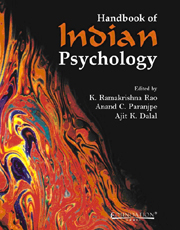Book contents
- Frontmatter
- Contents
- Contributing Authors
- Preface
- 01 Prologue: Introducing Indian Psychology
- 02 Indian Thought and Tradition: A Psychohistorical Perspective
- PART I SYSTEMS AND SCHOOLS
- PART II TOPICS AND THEMES
- 16 Indian Theories of Perception: An Inter-School Dialogue from Buddhist Perspective
- 17 Indian Psychology of Motivation
- 18 Personality in Indian Psychology
- 19 “Giving” as a Theme in the Indian Psychology of Values
- 20 The Making of a Creative Poet: Insights from Indian Aestheticians
- 21 Anchoring Cognition, Emotion and Behaviour in Desire: A Model from the Bhagavad-Gītā
- 22 Consciousness
- 23 J. Krishnamurti: Freedom from Knowledge
- PART III APPLICATIONS AND IMPLICATIONS
- Pronunciation and Transliteration of Sanskrit Alphabet
- Glossary
- Index
18 - Personality in Indian Psychology
from PART II - TOPICS AND THEMES
Published online by Cambridge University Press: 26 October 2011
- Frontmatter
- Contents
- Contributing Authors
- Preface
- 01 Prologue: Introducing Indian Psychology
- 02 Indian Thought and Tradition: A Psychohistorical Perspective
- PART I SYSTEMS AND SCHOOLS
- PART II TOPICS AND THEMES
- 16 Indian Theories of Perception: An Inter-School Dialogue from Buddhist Perspective
- 17 Indian Psychology of Motivation
- 18 Personality in Indian Psychology
- 19 “Giving” as a Theme in the Indian Psychology of Values
- 20 The Making of a Creative Poet: Insights from Indian Aestheticians
- 21 Anchoring Cognition, Emotion and Behaviour in Desire: A Model from the Bhagavad-Gītā
- 22 Consciousness
- 23 J. Krishnamurti: Freedom from Knowledge
- PART III APPLICATIONS AND IMPLICATIONS
- Pronunciation and Transliteration of Sanskrit Alphabet
- Glossary
- Index
Summary
The various Indian schools of thought such as Nyāya, Vaiśeṣika, Sāṃkhyā, Yoga, Mīmāṁsā, Vedānta, Buddhism, Jainism, Sūfi, etc. are a treasury of very rich analysis of psychological processes of mind-body interaction. They offer methodology for controlling mind, attention, memory, emotion and ways to attain self-realization. They encompass the whole spectrum of human life, and bring out a systematic analysis of different aspects of reality. The text of the Upaniṣads, Brāhamaṇās, Āranyakās, Mahākāvyas and Purāṇas along with folk literature from different parts of India offer a repertoire of wisdom and insights. In short, the Indian world view and its assumptions and methods about human reality do have potential to contribute significantly, not only to the world's reservoir of knowledge but also to the domain of practise and applications for solving personal, social and educational problems.
Indian psychology finds its roots in Indian philosophy, with its belief in the vast potential inherent in the human being. It has the “know-how” to raise the consciousness of a human being which is a focal point from any perspective for human well being. The Indian schools of thought give profound theoretical insights into the human condition. They also provide practical methods to find love, joy and peace, which they claim are within the individual. These qualities are considered to be aspects of one's true self, of pure consciousness. In Indian thought, a person is not a separate fragment, but on a deeper level, is one with all.
Classical Indian thought has been extraordinary in the sense that it has treated human personality as a subject, with emphasis on self-consciousness, free-will and self-determination.
- Type
- Chapter
- Information
- Handbook of Indian Psychology , pp. 348 - 360Publisher: Foundation BooksPrint publication year: 2008
- 3
- Cited by

